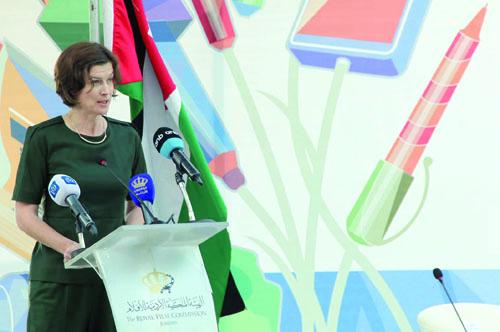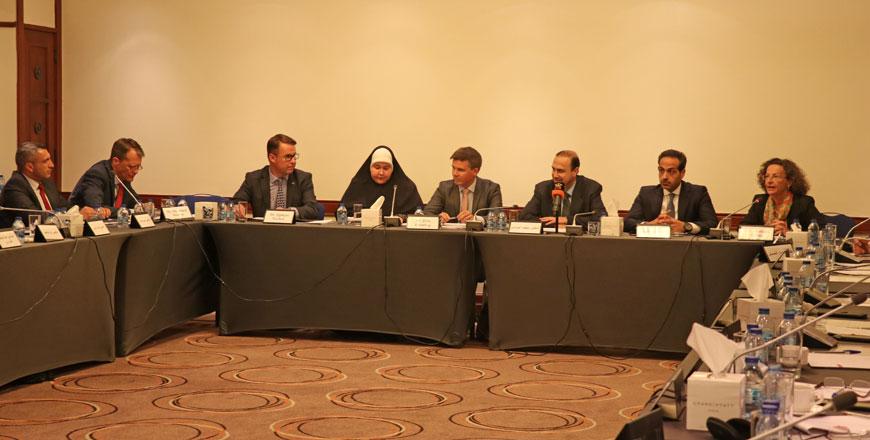You are here
UNESCO project empowers legal, media professionals
By JT - Oct 30,2017 - Last updated at Oct 30,2017
AMMAN — Building on the idea that journalists, bloggers and media professionals must have access to the best possible legal support in the event of legal action, UNESCO has been organising a series of training workshops for lawyers and media professionals under the banner of “Legal Support to Media in Jordan”, a statement from the UN agency said.
Launched in 2015 with the support of the government of Sweden, the project has been delivering practical trainings to 16 lawyers and media professionals focused on enhancing the legal awareness of media practitioners, and social media activists while also helping junior lawyers develop their professional legal skills in support of media related cases.
A lawyer who has been practising for 25 years, Khalid Khlaifat, conducted the recent UNESCO awareness raising sessions. “Many journalists are violating their own rights. They do not feel empowered and are self-censoring before even publishing. I am here to help change that,” he was quoted in the statement as saying.
Khlaifat, who said he is confident that the training will serve to liberate journalists, stated: “With their enhanced understanding of the national laws and international conventions related to media, they will begin to express themselves more openly.”
The training sessions focussed on issues of libel and slander while also touching on objectivity and integrity according to Jordanian law. Confidentiality of sources, respecting private lives and classified documents were also discussed, along with the importance of pre-publication and pre-broadcast legal counseling, the statement read.
Hadeel Srour, a young journalist and social media specialist at Alordon-alyoom channel, has benefitted from the training.
She said that, in journalism, “the lack of clarity surrounding our legal rights and obligations has made us feel reluctant to publish content freely,” noting that training has provided her with a “newfound awareness” surrounding legal recourse.
“I will now be able to report with more confidence!” she said in the statement.
In parallel to the trainings, the UNESCO Legal Support to Media in Jordan project is developing a new “online legal support” feature for the website, which will provide journalists with an opportunity to submit their content for legal review, prior to publication or broadcast, according to the statement.
The free service will be available 24/7 and media professionals will be able to view the CVs of the lawyers providing support and decide upon who is the most appropriate to reach out to, depending on the lawyer’s expertise and the nature of their content, the statement continued.
Almudather Al Qudah, who has been practising law since 2012 as a statutory lawyer, recalled that during his studies no courses were offered on journalism-related law.
“Most journalists in Jordan are made vulnerable by their legal ignorance and fall into legal traps with some of their content,” he said in the statement.
Taking part in the UNESCO training has given him a first-hand look at the struggles journalists face and inspired him to lend his legal expertise to journalists accessing the new “online legal support” feature.
“Lawyers like myself will provide all of their personal contact information on UNESCO’s Legal Support to Media site so that journalists are able to reach out to us with legal queries or for vetting of their content 24 hours a day, seven days a week. I am thrilled to be part of this,” he said.
The website will also act as an educational resource for journalists and lawyers alike. Useful links to background information on media-related laws will be accessible along with more than 100 media-related cases and their judgements from 2012 to present, according to the statement.
“Journalists work around the clock and do not have time for face-to-face consultations when working towards deadlines. This new feature will facilitate legal counsel for media professionals and also provide a host of legal information,” Srour said.
The “online legal support” feature is expected to be active by the end of 2017.
Related Articles
Media freedom in Jordan faces several restrictions and challenges, experts said Sunday, as the government said self-censorship among journalists has witnessed a steep decline.
AMMAN — The status of media freedom in Jordan is witnessing a decline amidst the fluctuation and ambiguity of legislation governing the sect
AMMAN — The UNESCO Amman office on Thursday celebrated the annual World Press Freedom Day (WPFD) with a roundtable discussion on this year’s


















